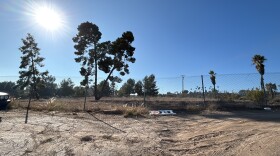A U.N. watchdog agency is blaming the Syrian government for a sarin gas attack on a rebel-held area of the country that killed more than 90 people in April.
The Organization for the Prohibition of Chemical Weapons, which confirmed in June that the agent used sarin, now says it is sure that the attack in Khan Sheikhoun in the northern province of Idlib was carried out by the Syrian government of President Bashar al-Assad.
Linda Fasulo, reporting for NPR from the United Nations, says the OPCW conclusion "coincides with initial findings by Washington in April, which resulted in a retaliatory U.S. missile strike against a Syrian airbase."
U.S. Ambassador to the United Nations Nikki Haley said in a statement that the report "confirms what we have long known to be true. Time and again, we see independent confirmation of chemical weapons use by the Assad regime."
As NPR's Merrit Kennedy wrote in June:
"The April 4 airstrike killed scores of people, and experts immediately pointed to the possibility of sarin. Sarin is more lethal than chlorine gas, which has been documented numerous times in Syria. ... The day after the attack, Doctors Without Borders said it had examined eight patients who "showed symptoms – including constricted pupils, muscle spasms and involuntary defecation – which are consistent with exposure to a neurotoxic agent such as sarin gas or similar compounds."
Shortly after the attack, U.S. officials rejected a claim by Russia, which is an ally of the Syrian government, that "a conventional weapons strike by the Assad regime accidentally hit a stockpile of chemical weapons that belonged to rebels or terrorists."
Copyright 2017 NPR. To see more, visit http://www.npr.org/.






